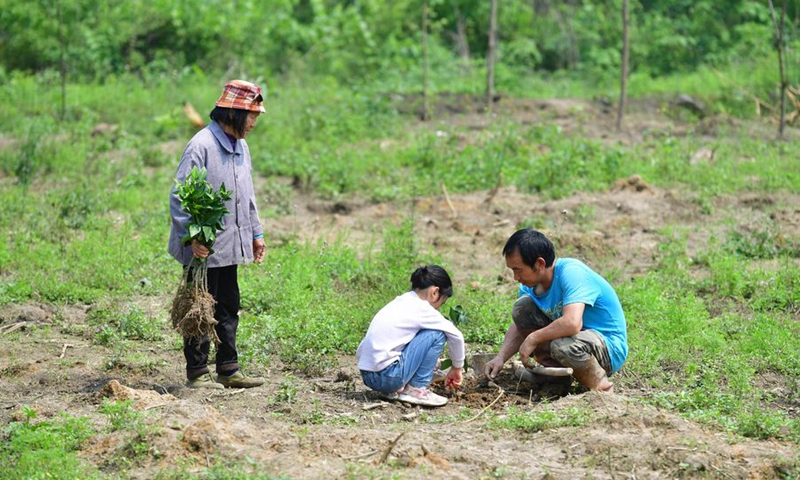
Pan Wenming (1st R) with his daughter Pan Yuxin (2nd R) and mother Qin Meifeng plant fruit trees in Tunqiu Village of Pingshan Township in Luzhai County, south China's Guangxi Zhuang Autonomous Region, April 7, 2020.(Xinhua/Huang Xiaobang)
About 25 million rural migrant workers may become unemployed due to novel coronavirus this year, accounting for nearly 10 percent of China's total rural migrant workers, a
public affairs professor predicted, calling for appropriate policies to be implemented.
Chen Zhigang, a professor at the School of Public Affairs at Zhejiang University, told the Global Times on Monday that the prediction was for a worst-case scenario under which China's economy doesn't recover until the end of this year.
However, even taking an optimistic view that the economy could return to normal starting from July, there may still be 2 million rural migrant workers who lose their jobs this year, said Chen, who is also dean of the university's China Academy for Rural Development.
Chen's team set up a model for three periods - lockdown, recovery and normalcy - and said rural and urban residents have seen their per capita disposable income reduced by 339 yuan ($48) and 816 yuan during the lockdown period, equivalent to a reduction of 20 percent and 18 percent respectively.
Incomes will gradually increase during the recovery period, but will still be lower than normal, and will come close to normal level if exports recovered during the normalcy period.
China's 288 million rural migrant workers are vulnerable groups in the job market in terms of the coronavirus impact, as the social security system has not fully covered. Most of them work in sectors such as catering, services and foreign trade, which have been among the hardest-hit by the virus, Chen said.
According to Chen's team, the catering and accommodation industries suffered the worst impact this year and had a slower recovery. Other affected sectors include the textile and food-processing industries.
Chen said his predictions should be an early warning for decision makers when drawing up policies, and he added that the employment issue involving rural migrant workers could threaten social stability.
Although Central China's Hubei Province was the worst hit region during the epidemic, it will not suffer the biggest economic losses among China's provinces and municipalities, partially due to its strong economy in 2019, Chen's research showed.
The COVID-19 pandemic has affected China's agricultural exports, especially with some countries refusing to buy Chinese products. This means it's not enough to only focus on the impact on production, but also to attach high importance to trade barriers set up by importing countries in the name of coronavirus epidemic control and prevention, Chen's team said.
Some migrant workers contacted by the Global Times said their incomes had slumped and they couldn't find any job at all due to the coronavirus.
A village official surnamed Liu from Jingmen, Central China's Hubei Province, told the Global Times that some villagers there had returned home after the factories where they had worked received no orders this year.
The village has been organizing job fairs to offer public welfare positions to those unemployed villagers, Liu said.
A housekeeper in Shenzhen, South China's Guangdong Province said that it took her two weeks to find a job in the past, but so far this year, nothing satisfactory has turned up.
Some rural migrant workers have figured out ways to reduce their income losses.
A vendor in a Beijing wholesale market surnamed Li told the Global Times that she had sold clothes for two years in the market, but this year she was forced to learn to sell clothes on e-commerce platforms and WeChat.
"I'm still in my hometown in [North China's] Hebei Province, and my income in the first half of this year was less than half of the same period last year," Li said, adding she could not afford the rent in the market any longer as few customers visited due to the coronavirus.
In response, many local governments have rolled out policies and incentives to help rural migrant workers find jobs.
Southwest China's Sichuan Province established an expert team to help rural migrant workers start businesses; and Northwest China's Qinghai Province offered subsidies to factories hiring rural migrant workers. It also provided public welfare positions to rural residents.
Chen's team predicted China's GDP growth would be around 1.2 percent if exports could not recover in the fourth quarter, and 1.9 percent if they could.
As for the impact on the domestic food market, Chen said that so far, the prices of staple food are stable and prices of vegetables and pork have risen during the epidemic, but not by much.
Chen suggested drawing up different risk responses according to different stages and industries, and that the country should prepare to deal with the possible resurgence of the coronavirus and push forward resumption of work and industries during the recovery period.

